Latest Posts by isang--mag-aaral - Page 5

Warning: 10 min read ahead :)
Coming into freshman year, I was relatively optimistic. However, I also did that thing where I prevent myself from having too strong of an opinion or extreme expectations (whether it’s positive or negative) before actually experiencing something, in order not to settle on a premature judgment. Even so, before starting freshman year, I was excited for a huge change - I was sick of mundane high school life. When I finally started college, man, was it liberating.
On Intellectual Development
I’d been taking more or less the same classes throughout high school. These classes covered the exact same topics - the only difference was the depth of the material. In college, however, I got to study a breadth of topics and subjects - astronomy, anthropology, information science, philosophy - subjects into which I barely dipped my toes, and when I did so, it was only through the books I read in my own time.
Choosing a liberal arts school is one of the best decisions I ever made because it exposes me to so many things I simply did not have access to in the earlier stages of my intellectual development. Like, yeah, I can read philosophy books whenever I want, but who will I talk to when I don’t understand an argument? How can I discipline my thinking, my writing, my approach to this new learning material? I can find any topic fascinating, but I can’t exactly set my mind on any of them because I haven’t had proper academic exposure. Plus, where high school humanities courses were easy and contained little engagement - just lots of material - the humanities courses I took in my freshman year of college got me thinking and reflecting and engaging with the material even when I didn’t intend to.
What I particularly enjoyed was the discussion sections in humanities courses. For those less familiar with the system, each course usually has a weekly discussion where students are split up into smaller classes and get to discuss anything related to the course material that week. I am not a naturally talkative or articulate person by any standard, let alone compared to Americans, so obviously these discussions were very challenging. But aside from helping me practice putting my thoughts into words and to interact verbally with academic material, these discussions did allow me to engage with the material in a way that I could not have alone, in a way that a STEM course probably could not be discussed.
My STEM courses, however, had their own merits. I very much enjoyed the project based, hands-on approach of most of the classes, especially when teamwork is involved. For my final project for a web programming and design course, my team and I got to make a website for an on-campus, student-run grocery store. For my intro CS final project, I got to code an entire game of alien invaders. This was so refreshing compared to the STEM courses I did in high school, where I was basically just learning the theory for 6 months, and then drilling past papers for the next 6 months. Theory in these STEM courses are also more involved and require more thinking, while high school science courses tend to be on the mechanical side.
College is also liberating because whenever I have the urge to understand something more deeply or find an ever-present curiosity sitting in the back of my mind, I can always enroll in a course or attend a lecture, instead of always being redirected to a predetermined course combination that doesn’t allow for intellectual exploration, and settling for an article, a youtube video, or a book instead. It’s an amazing feeling to always have a fountain of knowledge with which I can quench my intellectual thirst.
When it comes to learning things, I still have the same attitude as the wide-eyed freshman when I first came last fall. I kinda wish I had experimented more instead of jumping into my ‘intended major’, though. In my first two semesters here, I took astronomy, anthropology, comparative literature, computer science, economics, information science, mathematics, and philosophy, which is already quite a diverse course combination, but there are some other subjects I’d like to try out and definitely could have if I hadn’t settled for a major upon entering college. But wherever I end up - and I still have a year to decide - I’m sure I’ll choose something interdisciplinary and requires diverse ways of thinking.
On Paths (in Life, School, etc.)
The intellectual and academic rigidity of high school also kind of narrowed my scope for my own future. The courses and careers built into my head were the ones I was exposed to at school, at home, or in mainstream media. However, being exposed to all this new knowledge made me realize how little I’ve experienced - certainly not enough to determine where I’m going in life - and that it’s okay to not be sure of where I want to go.
There’s this perception that you should know where you want to be in the future by the time you turn 17 or 18 or whatever age you graduate high school, maybe even earlier if you take into account the college application period. But honestly, how realistic is that? I mean, it’s great if you discover your ‘passion’ early on in life, but then where’s your room to breathe? How can you explore the other joys life has to offer? How can be so sure that the path you’re on is the right one if you haven’t walked any other or even seen other possible paths?
College freed me from feeling like I need to be certain of where I was going. It freed me from trying to pursue a predetermined path based solely on my past academic experience, and instead focus on trying new things to build new experiences and knowledge that will evolve into a path that I enjoy every step of the way.
That also applies to choosing a major. I started out ‘wanting’ to do computer science - wanting being a loose term meaning something I thought I should do, based on my background, experience, academic strengths, and personality. But then I noticed myself being very impartial towards pursuing the major and just doing the minimum amount of work needed for the classes. I also took the minimum number of CS classes each semester because I was honestly not looking forward to them - and I didn’t particularly enjoy them when I took them.
It wasn’t the same with my Info Sci classes, for example, where I started early on projects just because they were enjoyable to do, even if they were challenging. I learned how to do certain things when they weren’t required for the class, experienced a good flow when doing the projects, actually came to class because I wanted to, had initiative when it came to group projects, made friends with people in the class who I didn’t know before taking it - I was just more involved in the class. Overall, I was more motivated to learn, and I think that’s the most important thing (maybe that’s just the ravenclaw in me, who knows).
On a smaller scale, you might be good at a certain subject in high school only to find out you’re suddenly incompetent in it and aren’t interested enough to push through it. I was a math person in high school - like I almost didn’t even have to try - but the two math classes I’ve taken so far in college were very challenging for me, and I suppose that’s a good thing because it allowed me to push my limits further and think about whether I enjoy the challenge.
Recently, I read that true happiness comes when you find problems you enjoy solving, and I think that’s a good ideology to help you choose the path you wanna take.
On Things that Spark Joy
This past year, I also found that I was a lot happier than in high school because I got to pursue the things that bring me joy, whether it’s in regard to academics as I’ve described above, extracurriculars, or things in my daily life.
I got to wake up at whatever time I wanted to and had breakfast how I liked - both in terms of food and whether I had my coffee at home or to-go, or example. I could change my physical appearance in ways that make me feel powerful and confident - in terms of clothing and hair and just how I presented myself in general. When I needed to breathe, I could walk around town or go down to the gorges. I could do my work when and where it was most convenient for me (most of the time).
With regard to extracurriculars, there were a lot of opportunities for me to try new things and continue doing the things I already love. I became a graphic designer for a cultural magazine, which allowed me to do one of my favorite things for a purpose towards which I’m happy to be working. My high school didn’t have any publications and had a seasonal need for graphic designers (mainly school events). I tried out for music groups, trained to be a DJ, watched and discussed films I wouldn’t have seen if it weren’t for Cornell Cinema, went to the concerts of bands that never come to Indonesia. I attended social events I was interested in, and skipped those that I didn’t want to go to, attended workshops, listened to guest lectures, etc. I hung out with people I enjoyed being around, instead of those with whom the only thing I had in common was physical location.
One of the things I’m still adjusting to, however, is the different dynamic of college friendships compared to high school friendships in that they’re more spread out in away - like you’d know a whole bunch of people but they don’t mutually know each other, and there isn’t really like a friend group. Maybe that’s just me. But either way, I also realized that my closest friends in high school took at least 3 or 4 years to go from merely a familiar face to people I’d call for four hours straight and send my sporadic thoughts to. So I guess I gotta be patient and have faith that with time, compatible and like-minded individuals will gravitate towards one another.
On Self-Discovery
Starting college also allowed me to be who I am and who I want to be as opposed to who people think I am and who people expect me to be. Whenever I decide to do something, I don’t have this fear of being ‘out of character’ since I haven’t entirely established who I am yet in the context of college. By doing things I’ve never done before, I learn things about myself that I probably could not have had I stayed in the same environment (i.e. high school).
Among other things, I noticed that if I don’t want to do something, I will deliberately sabotage myself to make it harder for me to achieve. On the other hand, if I want to succeed or do well in something, I’ll take initiative. That might seem obvious, but the thing is, I don’t always consciously know what I want or like so analyzing my own actions helps a lot. Because college exposes me to so many different material, there’s more data and information to work with, in which to recognize patterns.
A lot of the self-discovery that’s happened is personal, as it should be, but one of the things I’m really grateful for is taking that philosophy course the first semester of college. It made me reassess everything I knew and believed and decide on what values and thoughts I should keep.
I guess one thing I’d advise you to do is to experience new things and reflect on the impact of those new experiences. Sometimes it might not feel like you’ve done a ton of things after a whole year. I’ve had moments where I thought about all the things I thought I should have accomplished but didn’t, and I was like, ‘did I just waste an entire year doing nothing?’ But then I look back on the things I did do - took awesome courses, made amazing friends, got a job, learned to live on my own, etc. - and realized I gotta give myself a little more credit.
On Everything
Coming into college was a huge positive change. Something I wish I could tell myself at the beginning of the year is firstly not to fear making mistakes, so you won’t be afraid of trying new things. Keeping an open mind is great, but not entirely helpful if you don’t venture out into unknown territory to provide you with things to think about. Step out of your comfort zone and don’t be afraid to redefine yourself, but in all circumstances, don’t lose track of who you are.
If you’ve read this far, thank you so much! and please don’t hesitate to drop me an ask if you have questions or comments or concerns. Have an awesome day :)

the main takeaway: in my experience, people tend to bring way too much to college and then end up regretting it when they move out. you really don’t need that many things because somebody else or the front desk will likely have anything you need.
bold is for things i find essential.
SCHOOL SUPPLIES
folder for official papers like vaccination forms, work forms, etc
lined paper/notebooks
pencils
pens
something to hold your utensils on your desk/utensil cup/desk organizer
note pads
a pencil bag
tape
stapler - it’ll save your butt when you’re running to class late with an essay due. staple your work! not doing that can drive some professors nuts.
scissors
index cards
hole puncher
white out
printer paper
highlighters
paper clips
binder to hold old schoolwork
graph ruled composition notebook for stem classes
erasers
washi tapes/my crafting materials
i didn’t need anything different from high school. i wouldn’t recommend going out and buying a lot of new school supplies. perhaps just bring the usual stuff on your desk and in your backpack.
BED
a mattress pad - a lot of people on youtube will recommend that you buy these very expensive mattress foam pads. i didn’t use one – i just had a cover for the mattress. i’m sure the quality of mattresses will differ from college to college, but i slept fine.
sheets (set) - check to see what size your college uses. we use twin XL, so I had to go buy another set of sheets.
comforter - i had one duvet and one thinner blanket so i had layers to cover all seasons.
pillow - i only used one, and i find that if you loft your bed it’s much more convenient to have fewer things on your bed so changing your sheets isn’t as much of a hassle.
your favorite stuffed animal/comfort object :)
BATH
towels (2)
handtowel - my dorm didn’t provide paper towels for after you wash your hands
shower caddy - i would recommend something that can be hung up if your dorm has showers with hooks on the doors. mine didn’t, so i ended up buying a sturdy plastic caddy that i put on a stool in the shower.
in the caddy:
all your essentials (shampoo, conditioner, face wash, etc)
soap (i don’t recommend bar soap unless you have a ledge on your caddy where you can put it)
toothbrush, toothpaste, hairbrush, deodorant. just bring your basic stuff.
FOOD
one mug
electric kettle (if you drink tea or eat instant ramen a lot)
water bottle
snacks
chip clips
a fork, spoon, and knife
chopsticks
tea bags (you can steal these from the dining hall)
tupperware - i bring about two containers just in case i want to steal something from the dining hall, but that’s about it.
one plate - wouldn’t recommend bringing more than that. what do you need five plates for?
i would recommend against bringing kitchenware like pots/pans/cooking spoons/etc. my dorm has these available for residents; check with your dorm as well. i also did not cook or bake a single time the whole year, and my friend who cooked just used the communal pots and pans.
CLEANING/LIVING
lysol wipes/lysol spray
paper towels
tissues
key chain
zip loc bags
trash can - preferably with a lid so you can put food in there. best to bring your own trash can so you don’t have to resent your roommate for not taking out the trash when it’s their turn.
trunk/container - i use one for storage, one lockable trunk for valuables, and one container for food to keep out bugs. these containers also doubled as tables/night stands because i didn’t want to buy furniture.
desk lamp - if your roommate sleeps before you, it’s convenient to have a little light so you can work as they sleep.
laundry bag - would recommend something that is easily rolled/carried to and from the laundry room
laundry detergent
illness/first aid kit
bandaids
vitamin c powder
painkiller of choice
cough drops
tide stick
sewing kit - i patched up my roommate’s laundry bag once and definitely could’ve borrowed a suitemate’s kit, so these aren’t necessary in my opinion.
vacuum - check to see if your dorm has these available for check out. mine did.
microwave - i didn’t buy one. my floor had one in a communal area, and a few people in my suite had a microwave.
fridge - i just used my suitemates’ fridges.
ear plugs - for light sleepers/those easily disturbed.
CLOTHES
do not bring your entire wardrobe!!!!!!!!!!! do not!!!!!!!!!!!!!!!!!! just bring the things that you wear most often. remember: nobody actually pays that much attention to what you wear, and you’ll only see the same people 3 or 2 times a week, so you only need 3 unique outfits a week lmao.
do bring:
one formal outfit/pair of shoes (in case of interviews or dinner parties)
enough socks/undergarments to last as long as you want to go in between laundry loads. i only bring enough to last 1.5 weeks, and it forces me to wash my clothes regularly, which is nice in a way.
ELECTRONICS
phone and charger
laptop and charger
portable charger and cord
HOBBY
be real with yourself here. i played my ukulele or painted probably five times the entire year. i read none of the books i brought despite being an avid reader. i brought some of my crafting materials and only used them maybe three times.
cards - i brought some thank you cards/envelopes/stamps with me but you don’t have to. these are easily bought.
DECORATIONS
i did not bring any decorations and i don’t regret it, but a lot of my suitemates had tapestries and things. i would just bring stuff that’s already in your room at home. the less stuff you have to bring home the better.
best of luck with your first year! hope this helps :)
Thesis 101: Condensed version
In my experience, there is always someone somewhere starting their thesis, or struggling to the thesis finish line, or stuck in that middle part where it’s hard work without the reward. If you are just getting started on your thesis (or another big project) and you feel a bit lost and overwhelmed: fear not, I have your back. I created a list of tips that I found useful while writing my MSc thesis (psychology).
Let me know if this was helpful and if you want more. I originally wanted to post a whole series of tips on different stages of the thesis process, so consider this the drastically condensed version of that.
Getting started
Find a lab that works on a topic that interests you and with a team that you feel comfortable with.
Make sure you know where to go with questions and get to know the structure.
Set up your goals from the beginning and make a planning.
The best thing you can do at the beginning of your thesis is figure out what you want, what your university requires, and how the project works.
Planning
Create a list of all the steps you need to take to finish your thesis and divide them over the time (months, weeks?) that you have until the deadline.
At the very beginning, discuss this schedule with your supervisor.
Create in-between deadlines, with your supervisor and also with yourself.
At the beginning of each month, write down what you should do each week.
At the beginning of each week, write down what you should do each day.
Make a list of things you need to do each day, preferably the night before, so you can start right when you sit down.
You could even calendar block if that’s your cup of tea.
Steps
Here’s an example from a psychology graduate (me):
Literature search/brain storm
Research question, hypotheses
Summarizing results into proposal
Make a plan
Learn how to analyze data
Execute plan (e.g., data collection)
Analyse data
Write down results
Draw conclusion
Revision, feedback, revision, feedback, revision!
Reflection
Every week (or at whatever interval you prefer), sit down for 20 minutes and reflect on your progress. Ask yourself:
What did I do this week?
What went well?
What did not go as planned?
What can I do to improve next week?
What is on my to do list for the next week? What’s my focus? Are there things on the long run that I need to start working on?
Reflection keeps you on track but also allows you to think about what you learned in the process.


How to identify types of intermolecular forces!
In this post, you’ll learn:
*how to identify intermolecular forces of the given substances

HOW TO WRITE A HIGH-GRADE RESEARCH PAPER
~~~~~~~~~~~~~~~~~~~~~~~~~~~~~~~~~~~~~~~~~~
The first time I had to write a research paper for university was one of the most stressful experiences I’d ever had - it was so different to anything I’d ever done before and caused me so much anxiety! It turned out that I’m pretty damn good at writing research reports and I’m now looking to pursue a career in psychological research.
I have never received less than a First (or 4.0 GPA for you American studiers) in my research papers so I thought I’d share my top tips on how to write a kick-ass, high-grade research paper.
*disclaimer: I am a psychology student, my tips are based on my personal experience of writing up psychological research (quantitative and qualitative); therefore, they may require some adaptation in order to be applied to your field of study/research*
These tips will be split up into the different sections a research paper should consist of: abstract, introduction, methods, results, discussion.
ABSTRACT
The aim of an abstract is to summarise your whole paper - it should be concise, include key-words, highlight the key points of your paper and be written last.
When I say concise, I mean concise! The abstract is what other students and researchers will read in order to decide whether your research is relevant their own work and essentially determines whether or not they’ll read on - they want to know the key details and don’t want to be overwhelmed with information.
I always aim to keep my abstracts under 250 words. I set myself this limit to stop myself waffling and dwelling on unimportant points, it helps me to be really selective of what I include and ensures I’m gripping the reader from the start.
Your abstract should discuss the research rationale, the methods and designs used, your results and the general conclusion(s) drawn. One or two sentences on each of these topics is enough.
Make sure you’re using key-words throughout your abstract as this will also help the reader decide whether your work is relevant to theirs. You can make key-words super obvious by highlighting them in a key at the bottom of your abstract (see below) or just used jargon consistently. Using key-words is also important if you’re looking to get your work published, these words will help people find your work using search engines.

Finally, write your abstract last! An abstract is a summary of your whole research paper which makes it practically impossible to write well first. After writing the rest of your paper, you will know your research inside and out and already have an idea of what key things you need to highlight in your abstract.
INTRODUCTION
For me, the introduction section is always the most intimidating to write because it’s like painting on a blank canvas - massively daunting and leaving you terrified to make a mistake!
The aim of an introduction is to provide the rationale for your research and justify why your work is essential in the field. In general, your introduction should start very broad and narrow down until you arrive at the niche that is your research question or hypothesis.
To start, you need to provide the reader with some background information and context. You should discuss the general principle of your paper and include some key pieces of research (or theoretical frameworks if relevant) that helps your reader get up to speed with the research field and where understanding currently lies. This section can be pretty lengthy, especially in psychological research, so make sure all of the information you’re including is vital as it can be pretty easy to get carried away.
This background should lead you onto the rationale. If you’ve never written a research paper before, the rationale is essentially the reason behind your own research. This could be building on previous findings so our understanding remains up to date, it could be picking up on weaknesses of other research and rectifying these issues or it could be delving into an unexplored aspect of the field! You should clearly state your rationale and this helps lead into the next section.
You should end your introduction by briefly discussing your current research. You need to state your research question or hypothesis, how you plan on investigating the question/hypothesis, the sample you plan on using and the analysis you plan to carry out. You should also mention any limitations you anticipate to crop up so you can address these in your discussion.
In psychology, references are huge in research introductions so it is important to use an accurate (and modern as possible) reference for each statement you are making. You can then use these same references in your discussion to show where your research fits into the current understanding of the topic!
METHODS
Your methods section should make use of subheadings and tables where necessary and should be written in past tense. This can make the (potentially) lengthy section easier to navigate for the reader. I usually use the following headings: participants, materials, design, procedure.
The participants section should describe the sample that took part in your research. Age, gender, nationality and other relevant demographic information should be provided as well as the sampling technique. Personally, I use a table (see below) alongside my continuous prose as an alternative way of viewing my sample population. Please note, if you’re using a table make sure it adheres to your university guidelines.

The materials section of your methods should include any equipment, resources (i.e. images, books, diagrams) or any other materials used in your data collection. You should also reference the program that helped you conduct your analysis. For example, if you are writing a qualitative research paper, you may want to include Microsoft Word in your materials if you use the program to transcribe interviews.
You should then describe the design used in your research. All variables should be identified in this paragraph, if relevant. You should also discuss whether your research is within-groups or between-groups, again only if relevant.
Last is your procedure section - the most important one! You must write this section with enough detail so that anybody could pick it up, read it and conduct the same experiment with ease. You should describe what participants were required to do, how data was collected and it should be written in chronological order! While it’s important to provide enough information, try not to overwhelm the reader with lengthy sentences and unnecessary information.
RESULTS
Your results section’s sole purpose is to provide the reader with the data from your study. It should be the second shortest section (abstract being first) in your research paper and should stick to the relevant guidelines in regards to reporting figures, tables and diagrams. Your goal is to relay results in the most objective and concise way possible.
Your results section serves to act as evidence for the claims you’ll go on to make during your discussion but you must not be biased in the results you report. You should report enough data to sufficiently justify your conclusions but must also include data that doesn’t support your original hypothesis or research question.
Reporting data is most easily done through tables and figures as they’re easy to look at and select relevant information. If you’re using tables and figures you should always make sure you’re stating effect sizes and p values and to a consistent decimal place. Illustrative tables and figures should always be followed by supporting summary text consisting of a couple of sentences relaying the key statistical findings in continuous prose.
DISCUSSION
The discussion section should take the opposite approach to your introduction! You should start discussing your own research and broaden the discussion until you’re talking about the general research field.
You should start by stating the major findings of your study and relating them back to your hypothesis or research questions. You must must must explicitly state whether you reject or accept your experimental hypothesis, if you have one. After stating your key findings you should explain the meaning, why they’re important and where they fit into the existing literature. It’s here that you should bring back the research you discussed in your introduction, you should relate your findings to the current understanding and state the new insight your research provides.
You should then state the clinical relevance of your research. Think about how your findings could be applied to real-life situations and discuss one or two practical applications.
After this, discuss the limitations of your research. Limitations could include sample size and general sample population and how this effects generalisability of findings, it could include methodological problems or research bias! These limitations will allow you to discuss how further research should be conducted. Suggest ways in which these limitations could be rectified in future research and also discuss the implications this could have on findings and conclusions drawn.
Finally, you need to give the reader a take-home message. A sentence or two to justify (again) the need for your research and how it contributes to current understanding in the field. This is the last thing your audience will read so make it punchy!
~~~~~~~~~~~~~~~~~~~~~~~~~~~~~~~~~~~~
That’s it folks! My tips for writing a kick-ass, high-grade research paper based on my personal experience. If you have any questions regarding things I’ve missed or didn’t provide enough detail of, then please just send me an ask!
Also, if any of you would like to read any of my past research papers I would be more than happy to provide you with them :-))
if you are seeing this, you are going to prosper. you are experiencing a new part of your life where you will bloom into a better version of yourself and flourish. abundance is coming your way; love is coming your way; peace and clarity are coming your way. you have nothing to fear and even less to worry about. the darkness around you has been the soil and you are now getting ready to sprout. you are going to prosper
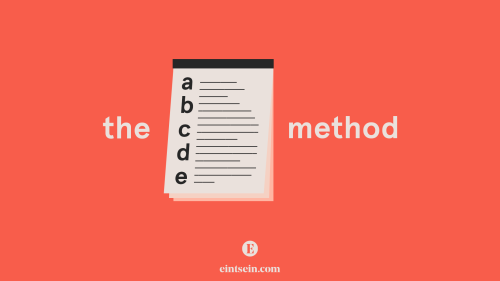
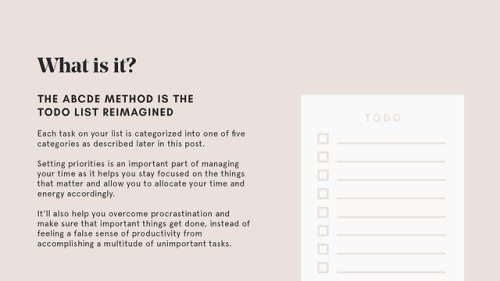





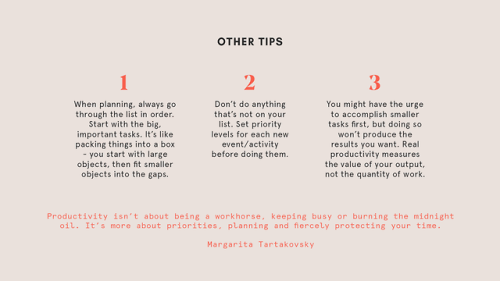
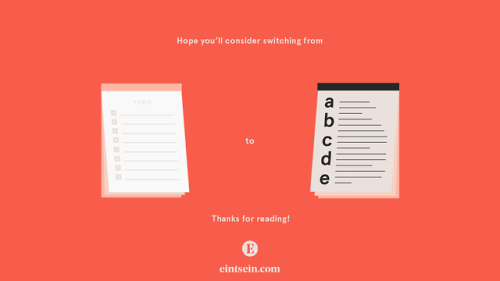
The ABCDE Method: Accomplish Tasks more Efficiently
I recently came across the ABCDE method that’s similar to what I do to stay productive each day: instead of lumping up all your tasks, sort them into categories and tackle each of them differently. Here’s an outline of the method. Hope it helps :)

How to Brace Yourself for a New School Year
August is fast approaching once again! Though I’m all for “starting the year/ school year right”, I think it’s pretty much unavoidable for us to get off track. A lot. Because of that, I put together this infographic to help minimize those stressful moments in your brand new school years.
First of all, get your shit together. And I mean both physically and emotionally.
it’s a new start my friend!! detox your mind of all those negative thoughts (and people) and embrace the opportunity to start over.
gather all the supplies you need. if you’re moving into a dormitory, make sure it’s equipped with everything you need to feel at home.
her campus college packing list
do’s and don’ts
don’t go overboard with this step, but go get yourself some new stationery. choose wisely, and ensure that you’ll actually use it and it’s not just for purposes of aesthetic. we all want nice instagram feeds, but don’t let that be a reason for you to buy too much pretty stationery.
why not think of a note taking system before classes begin?
the cornell system
mind mapping
flashcards
not all may find the idea of going back to school exciting, but you gotta have the motivation to keep that positive mindset in your head throughout the year! go you.
Organize your study space. You may have to stay in it much longer than usual now.
lighting is important. it’s oversaid, but never untrue. opt for natural lighting when you can, but if you can’t or you’re a night owl, get a good study lamp to brighten up those long hours of work.
I did say you’re probably gonna be staying here for some long bouts of time, but that doesn’t have to be a bad thing. make your desk one of your favorite places to be in. if you want to, make it really pretty. hang up some motivational posters or quotes - perhaps you even want a color scheme with that.
desk inspiration
quote posters to get you going
quotes from writers
have an accessible stash of stationery on your desk at all times so that you don’t have to go looking for a pen and a sticky note when you need to write something down. keep pens, pencils and highlighters in a jar near you.
keep something green on your desk, like a succulent. plants are adorable and the sight of them can boost your productivity.
have a planner or a bullet journal, and make space for that too.
a bujo masterpost
if working with music helps you, have headphones with you as well. always have a study playlist on hand. go for instrumentals or wordless tracks.
study playlist masterpost
make it a habit to keep your space in check every night before you go to bed. it really could make a big difference in how much work you’re gonna be able to do. don’t forget to stay clear of distractions!
Create a stress management system.
okay. this is what i’m telling you to brace yourself for. there are gonna be those days or those moments when you’re gonna feel really depressed or panicked. you’re gonna be okay. feel free to message me or any other studyblr - we’re here to listen =)
take some time out to practice self care and put off work, even for a bit. school is not the most important thing in the world, keeping yourself alive and healthy is. you can sleep, be kind to yourself.
self-care reminders
soothe yourself
go get some food too. you can prep some of your own if you’d prefer.
food masterpost
mood boosting food
never ever ever underestimate the power of exercise. the feeling of finishing a workout is so so so satisfying and I can guarantee you will feel better in no time.
the seven minute workout
popsugar fitness
take out your mat and do some yoga. stretch out all those muscles you held in place for so long sitting at your desk.
I find it important to always have a mini-collection of unread books. if you don’t have any, one of my favorite places to be in is a bookstore or library - and I just read whatever I find. the results can be life changing.
take time to hone your skills in your hobbies. if you can, do it everyday - do that one thing that makes you really happy daily. maybe you like singing. or playing the guitar. or painting. whatever it is, go do it.
write it down! I keep an electronic journal and it really helps to just spill your thoughts out on a notebook or your phone.
honey, please talk to someone if you need to. it won’t hurt.
Get a headstart on academics.
especially on subjects that are easier with advanced reading. if you already know what books you’re going to be tackling for english or literature, go read them.
sparknotes
shmoop
try asking upper years who used to take your classes if they still have their course outlines, or any material they were given before. this can save lives.
gonna be taking a language class? why not start learning it already?
duolingo
memrise
find textbooks and start using them!!
don’t have any idea of what you’re going to study yet? that doesn’t mean you should stop learning something new. you can listen to a ted talk or join an online course.
ted
crash course
coursera
Finally, set SMART goals for the school year. And have a concrete plan for how you’ll reach them.
what average are you aiming for? what organizations do you want to join? make your goals realistic and specific.
motivation is very important, but honestly, you can’t count on it to be with you every single day, every single moment of your life while you’re working for your goals. what will push you forward then? discipline.
building discipline
surround yourself with a community people who support you. like I said in the first step, detox all those negative people from your life. find ways to work with your friends and help each other in attaining goals.
set rewards for yourself too, not just in the long run but for the little things like finishing a good study session or passing a paper early.
study reward ideas
that being said, don’t underestimate the power of setting your short-term goals. those will be your stepping stones to pursuing the bigger picture you envision for yourself.
Tumblr and Pinterest, provided you don’t go too far in using them, can serve your daily doses of inspiration. don’t just use them for the sake of looking at aesthetically pleasing shots, though.
on a final note, don’t let academics take over your life. I hope you have a fantastic year, and good luck!

I’ve been asked a couple of times now what is my approach to self-study, and this is my messy attempt to answer that question. All of this is true for me, and might not work for someone else; still, I hope it may help somebody!
1. Getting acquainted with the language
When you’re learning a language with a different writing system than your own, that’s the first thing you have to tackle, of course; but I usually try to get some background information even when the alphabet used by my target language is the good old Latin one. One thing I pay extra careful attention to is phonology: you want to get the sounds right from the very beginning, before you develop any bad habits (also, learning IPA changed my life). Having an accent as close to a native’s as possible is not necessarily the goal (I do like to work on that, but to each their own), but being understood is! And incorrect pronunciation can sometimes hinder comprehension, in some languages more so than in others. So don’t obsess over it, but don’t overlook it completely either. Getting to know the sounds of a language right away can also help you understand what people are saying a little quicker, and figuring out how new words might have to be read. Wikipedia is usually not bad when it comes to phonology, and Omniglot is a good resource as well.
2. Finding a good textbook
I’m a free spirit so I often find myself not looking for a textbook right away, and just chaotically absorbing information from different sources (see immersion below). When I do set my mind to choosing, though, I try to stick to one well-made textbook that I like, which should possibly contain clear grammar explanations as well as exercises. The temptation to hoard resources is strong – and I’ve succumbed to it myself more than once haha –, but I usually try to steer clear from using more than one textbook at the same time (although I do have separate, more thorough grammars on the side more often than not). I’d rather use a physical book if I have the chance, but if that’s not your thing or you don’t have money to spend on that, that’s okay: you can find loads of perfectly good books or websites online!
3. Compulsive translation
Anyone who’s been following my blog for a while probably knows that I love translating virtually anything: from songs to poems to short stories. It’s something that has always been a part of my life, and I thoroughly enjoy doing. It’s also an awesome language learning technique, which will help you enrich your lexicon and teach you tons of new turns of phrase in your target language. It works both if you translate from your native into your target language and vice versa: find a good bilingual dictionary (I prefer paper dictionaries because they provide more examples of usage, but again, you do you) and look for equivalent expressions, don’t just translate word for word! It might work sometimes but not always. When it comes to translation, Reverso Context is a great resource for some languages, because it provides translation in context, taken from a massive corpus heavy on subtitles – which you shouldn’t trust all the time, but will help you as long as you put some critical thinking in.
4. Immersion (you don’t say)
What a surprise, right? I usually start listening to music / watching video content right away; I wasn’t that big on YouTube before but language learning has made me change my mind. You don’t have to get everything: even if you understand 3 words out of 20, this will help you grasp the rhythms and intonations of the language. This depends on how many similarities my new target language shares with the ones I already know, but as a general rule I use Italian (or English) subtitles in the very beginning, then move on to subtitles in the target language and finally get rid of them entirely. Some people will argue against subtitles of any shape or form, but I can only speak for myself and they’ve helped me quite a lot in the past. The way I see it, reading is also essential: if I don’t have time to leaf through novels, I usually check out at least an article a day in my target language and write down the words I don’t know, plus their Italian translation.
5. Routine – the good kind
In short words, I strive to make the new language a part of my life. There are a thousand things you can do: change your phone settings? Great! Check out the news? Even better! If you’re out of ideas, here are a few suggestions. And don’t worry if you struggle at first: in fact, the start of this process is a bit rocky for almost everyone. Consistency, however, is the key: once the early, most difficult days are over, all of this will start to come natural and stop feeling like a chore! The more you do it, the faster this process will be.

“Surrealist” Films & TV Alignment Chart


190806 //
Mom brought the printer to the repair shop last Wednesday, and because of that I am enjoying printing stuff again! I decided to pick up a book again, since it's been so long since I read for leisure. I have already read the Time Keeper before, but now I plan to read it again with a deeper understanding of the world than I did 2 or 3 years ago.
I went out to see my friends this Friday afternoon. We met up at a popular café, and as usual, I'm late. It was my first time eating at the said café and I'm looking forward to going there again. The food is okay, the ambiance is good even though it doesn't have booths that would give a semblance of privacy. I thought it would be hard for the people to get intimate and personal with each other since you can clearly see everyone around but I saw that the people we're eating with actually enjoyed their companies.
It was fun seeing two of my friends again, since I last saw the two of them at our graduation. I hope we still meet in the future since we won't be studying at the same school anymore. Best of luck to Mama and Bulailai.
when you find an academic source that’s perfect for your paper but it’s behind a pay wall

What i’ve learned from college thus far
Stop studying the night before. I have noticed that if i keep forcing myself to learn until last minute (which it’s not gonna happen, you know what you have been processing for a while not just right before they hand the paper sheets) i start doubting myself more
Go with an “i don’t care anymore” attitude to the exam. This one is my fave. With this i mean letting go of every single worry you may have of failing in that moment (not ignoring your books the whole semester) If you don’t care about failing there’s no tension or stress during the exam, therefore you will be able to think more clearly than under pressure.
Figure out your minimum hours of sleep. I learned that i need at least 5 hours to function properly. Find yours and use it in your favor.
Relationships with classmates. You probably will only see your friends in some classes or just one, dont let this unmotivate you and not attend to lectures!! Everyone is asleep and no one will think you’re awkward for sitting alone. Don’t force friendships or try acting like someone you’re not, people can see it and repells them.
Relationships with teachers. Can’t stress this enough, if you’re gonna put effort in creating a bond with someone in college, it has to be your teachers. Try getting there early and pick a seat in the front, make questions via email or in person, if you’re shy like me wait until the end of the lecture and talk to the teacher instead of asking out loud.
Learn from failure. Don’t waste precious time giving yourself a hard time, it won’t make you any smarter. Pay attention to details and correct them for the next time, that’s how champs do it AND YOU’RE ONE OF THEM!
Relaxing. I know how guilty you feel when it’s been days and you haven’t looked at your notes, but hey we all go through that. It’s important to disconnect a little sometimes and come back with a %100 battery instead of a %35, am i right? Just don’t let the relaxation become 2 weeks or a whole month.
Hope these few tips may help you if you need them ♡
Part 2
Dorm Shopping 101: Making a List
The earlier you start the better, back to school sales are not the end all be all of deals. Shopping for your dorm and college can be overwhelming, but there are ways to make it more approachable. Before you buy anything you should make a list to avoid overspending and overpacking.
As you make your list, consult your family and older friends that went off to college. They’ll help you figure out what you really need to bring.
Another source to consult is your university, they’ll often provide floor plans, dimensions, a list of what the room comes with, and a list of banned products on their website or any housing information they sent you.
Actually write your list, it doesn’t matter if it’s on paper or the notes app on your phone, you’ll need to refer back to your list when you’re shopping
It helps if you write your list in categories like decor, bedding, lighting, toiletries, shower supplies, appliances, etc.
Look at what you use around your house to add to your list to make sure you don’t miss anything important like laundry detergent or sponges for washing dishes.
It helps to know if you will be in a community style dorm or a suite style for things like bathroom supplies and cleaning supplies
Talk to your roommate(s) so you don’t end up with double the stuff
Remember you can always buy more later
Note that dorm rooms are relatively small, so shop compact. We will cover how to make the most of what little space you have in future posts.
Dorm life isn’t all about making your dorm look presentable: you have to survive too if your meal plan is limited. Be prepared to shop for food and snacks that can last you through the first half of the semester until you have time to go shopping again.
Personally, I like to write my lists out by hand, it helps me remember it and keep me on task. My bullet journal is great for these things because then I know where my list is rather than trying to keep track of a random slip of paper. - Clove
When I write a list on hardcopy paper, I have a professional black leather planner which can be used for a wide variety of things like academics and important career-related information. It may be useful to invest in one from Franklin Covey or your local office supply store. Otherwise, when you make a digital list, preferably use Google Docs where you can access it from any device. - Jasiel
HOW TO WIN AT FRESHMAN YEAR IN COLLEGE Pt 1. (Academics)
Aight here we gooo
Don’t think about when it’s due, think about when you can get it done by. Always try to get work done as soon as you get it, because the information/motivation is a lot more likely to make you productive immediately after. Don’t backward plan and leave things to the last minute.
Research your course. Find out about the electives you have to take, the ideal course load and the progression requirements. Don’t graduate a semester late because you forgot to take one 1000 level English course.
Make a nice schedule! You’re going to be stuck with this for a year, so definitely invest a couple hours into making a good one. (Separate post on drafting a schedule coming up.)
Try to live on campus, preferably in a traditional dorm set up. Not only does it improve the ‘college experience’ but also really helps with networking.
Do not invest in a loooot of expensive stationery. I know, I know, ironic to say as a studyblr. But coming out of high school where we all took notes on paper, a huge stationery haul might be obvious. But definitely wait a couple weeks into school to see if you want to stick to paper notes or if you’re more comfortable with the laptop.
Sit. At. The. Front. Beginning in the first week. Freshman year, it’s super tempting to abuse your freedom and just not show up to class. It is imperative that you put yourself in the field of vision with the teacher, not only to make a good impression but also to hold yourself accountable to actually show up to class, because the professor will probably notice your absence and might discount you a little bit. It also helps with the ‘halo effect’, where you stand out right in the beginning, and that’ll tide you over.
Don’t just show up to office hours, take your notes/solve a mock paper, and get feedback. Doing this a couple times before the exam will help you put together the perfect rubric for answering just about any style of question. If it’s an essay course, the teacher will often make corrections and even send you helpful resources to improve.
Create/join a Facebook group for your subject, and exchange notes with people over there. It’s reassuring to know you have a backup if you skip class.
Try to inform your professor before hand if you’re skipping class. This policy might be different for different schools, but telling your professor ahead of time that you won’t be attending, or even just shooting them an email at the time of class might help with making up for lost time, extra credit, and being able to skip with more ease in the future, since the prof thinks you’re serious about this class.
Spend the summer before college chilling, yes (I’ve written a post about it here). But also check this out to make it a little more productive, and learn a few handy day to day skills.
Pt. 2 about college scheduling will be up tomorrow!
how I keep myself sane during summer break.
I think we can all agree that the mere idea of having holiday breaks from boring lectures and all-nighter study sessions sounds like heaven; although this romanticized idea of having so much free time often turns into wasted summer days, oversleeping, and basically an anti-social teenage version of house arrest. so, to help you out (or, more to help Myself) here are some things I do to keep myself busy, on a budget (kind of), and mentally healthy during long breaks from school.
continue your morning routine. this is important; by this I mean to basically treat your summer mornings as you would your school mornings, without the rush and alarm. brush your teeth, brush your hair, start/continue a skincare routine, get out of your pajamas and into real clothes, make your bed, make some coffee, eat some breakfast, do it with some music on, whatever you want. this keeps your mind and body into a daily routine. don’t let all your precious no-class mornings of summer go to waste!
savor sleeping in, but not too much. I know its super tempting to go to bed at like 2 AM and wake up the next “morning” at 12PM, but trust me, you’ll regret fucking up your sleep schedule once you actually have to set an alarm and get your ass to class next fall. I’m not saying you should force yourself to set a summer alarm (although, if you really want to train yourself this isn’t a bad idea tbh) but for the love of god, at least go to sleep and wake up at reasonable times. don’t waste your entire day!!
force yourself to see your friends a couple times a week, even if you really don’t want to. obviously this excludes mental health days, but I’ve found that spending time with my friends actually distracts me from any anxiety I’ve felt during the past week. I love my alone time, but human interaction is super important both mentally and physically. as college students we’re all pretty much broke, so don’t underestimate the power of free things- watching netflix at someone’s house, having a boardgame night, going to parks, you name it. as long as you’re with your friends, you’ll have a great time!
clean out your music library + make a playlist or two. y’all know I love a good playlist. this is something totally 100% FREE, and a perfect way to make use of your free time. delete all the stuff you don’t listen to anymore and make a few playlists of your favorite songs, or even go with playlist themes to organize your songs. it’s fun and your future self will probably thank you later for getting rid of so much audible junk.
get back into reading. this is something that was on my personal summer to-do list. I haven’t read a book for myself (aka not for a class) in sooo long, and let me tell you- I don’t know why I ever stopped reading. I know for a fact that once the semester starts I’ll have zero free time to read for myself, so summer is the perfect time to get into a new book or two!
eat your three meals a day +hydrate. I mean this. its very easy to skip/forget meals when you really don’t have any set schedule whatsoever, so plan your meals into your day. even make an alarm if its necessary. also: if you don’t know if you’re drinking enough water, you probably aren’t.
deep clean your room/workspace/closet. I’m super guilty for putting this off but, long breaks like summer are the perfect times to deep clean! what makes it easier for me to clean my room is to go section by section, which means not doing it all in a day (because that gets hella overwhelming and stressful, let me tell you). grab a garbage bag, put on some tunes, and pick a section to clean that day; you’ll be done with the entire space in no time!
outfit plan. for someone like me who has way too much in my closet and somehow still “never has anything to wear”, this is essential! set some outfits out on the floor/bed and take pics of them on your phone so that you can look back on them for some style inspo the next time you have “absolutely NOTHING to wear”.
find a new hobby, even if you’re bad at it. make some collages of your friends, make a scrapbook, learn photoshop, paint a little, learn how to sew, garden, cook, practice your phone photography skills… if there was a time for you to try out new things, it’s NOW.
make a post about all the shit you should do. I’m doing it right now. literally. you’re reading it right now. its not a bad idea.
if you know you have shit to do, plan it into your day! this is where the planner/agenda/bullet journal aspect comes in. having no class and no homework is not an excuse to stop planning out your day, your week, or your month. make some task lists and pencil in your dentist appointments and dates with people and whatnot; and even journal your days while you’re at it! if you’re a planner, never stop. Future You will thank you for it, I promise.
do you have any non-fiction book recommendations?
i know why the caged bird sings - maya angelou
maya angelou puts the same amount of care into her words in this book as she does with her poems
i do remember the first couple of chapters being hard to get thru bc i was easily bored, but also, i was in the height of my laziness during the summer + this was for an assignment lol
when breath becomes air - paul kalanithi
beautiful prose, will make you cry
guns, germs, and steel - jared diamond
a rly spicy take on history that was rly enjoyable
also watched the documentary version of this in whap
outliers: the story of success - malcolm gladwell
even spicier than mr diamond’s book lol
discusses success from a different perspective
definitely interesting to read through, although i’m not sure if i agree with all of his conclusions
malcolm gladwell also has a podcast called “revisionist history” that’s rly interesting and does a similar thing with this book where he examines things from a different angle
five days at memorial - sheri fink
an account of what happened at a hospital struck by hurricane katrina
i feel like some perspectives should have been afforded a bit more leeway and more description compared to others, but it was still a decent read
hope and other luxuries: a mother’s life with a daughter’s anorexia - clare dunkle
i find that all the books i’ve read on anorexia so far have been personal accounts, so it was interesting to read about it from the mother’s perspective
i used this book as a basis for my junior research paper actually
the immortal life of henrietta lacks - rebecca skloot
i just think the case of henrietta lacks is fascinating
on writing - stephen king
a hybrid between an autobiography and a manual on how to write
an interesting read, although i’m fairly sure that stephen king would kill me for how many adverbs i use on a day to day basis
there were a couple others, but i don’t rly remember them very well :( hope this helps!!





A friendly ghost rest stop before you continue your day! 💗
Loading Penguin Hugs | Instagram | Patreon

from pinterest









Good Omens + German phrases (with no English equivalent)







A Guide to Audio Journaling
This past month (or longer, I think) I switched from regular, written journaling to audio journaling, and I thought it’d be great to share my experience: the practice, what I actually do, why I do it, and some things to think about if you wanna try it out.
I keep all my audio journals on the voice memos app on my phone, but if any of you know an alternate platform to do so, feel free to share!
Anyway, hope this helps, and as usual, if you have any questions, don’t hesitate to send me a message or drop me an ask. Have an awesome week :)
hello :(
i feel like i'm burning up with fever, but i'm actually not sure (since we don't have any thermometers around. lol) but today should be good. i can feel that today would be good, just not to me. 😂 just kidding, i need to go now!
please take care, dress warmly, and don't get sick! 💖
Can I just share how I failed a subject because of my anxiety? Or maybe my laziness, I don't know what fits.
I'm trying to remove the toxic mindset of a student which is the idea that "Grades are ALL that I am." It was good, my grades are getting better except for one subject (if you follow my blog u know which one).
Something about either the subject matter or the instructor or maybe even the schedule puts me off in taking that class. Every time I see my instructor I get the feeling that she's judging me. I know she hates me or my habit of being late/absent in her class but the fact that she looks at me at a certain way added to my nervousness that I usually end up avoiding it altogether. I missed three meetings out of 12-ish meetings, and it's not good (since we can only miss three. yikes)
I know I should've dealt with this better but I can't seem to get past my fear of my instructor. I don't know how will I fix this (or if I can even fix this) but i'm really torn right now. I don't know if my bad grade is because of my performance on the specific subject, or the mindset of not treating my grades as important as before.
Some words of encouragement or advice would really be a great help. :(
you know, life doesn’t have to be competitive. you don’t have to get in the very best university; you don’t have to get the highest paying career there is. you don’t need to compare and compete with everyone else in the world. you need to do what’s right for you. you need to relax, take a breath, and say ‘what do i want, for myself, to live as i want to’. and, if that involves high ambitions, then that’s fine. because you chose those ambitions on what you desire as an individual, and not on what is expected in order to succeed. let’s be ourselves this year.
We'll get our report cards again today! Please wish me luck~ 😄
180611
We received our report cards for the first semester today. Most of my grades remained the same from the midterms all through out finals. One subject decreased drastically, but there were few marks that increased. I’m happy with the results, but I know that I can do better than that. Second sem will definitely be better, I will make it better. Let’s do our best! :–))
180611
We received our report cards for the first semester today. Most of my grades remained the same from the midterms all through out finals. One subject decreased drastically, but there were few marks that increased. I'm happy with the results, but I know that I can do better than that. Second sem will definitely be better, I will make it better. Let's do our best! :--))
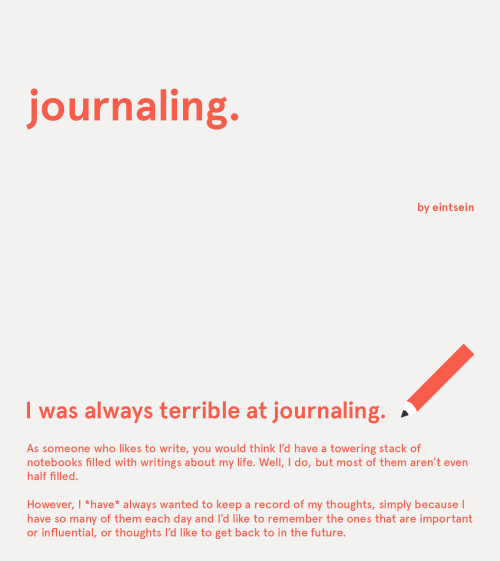
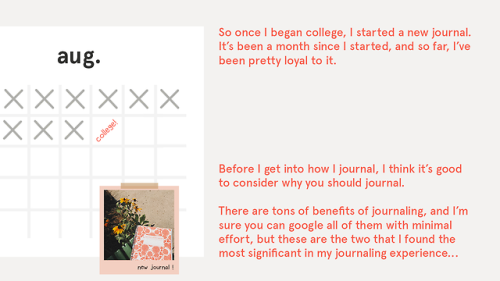

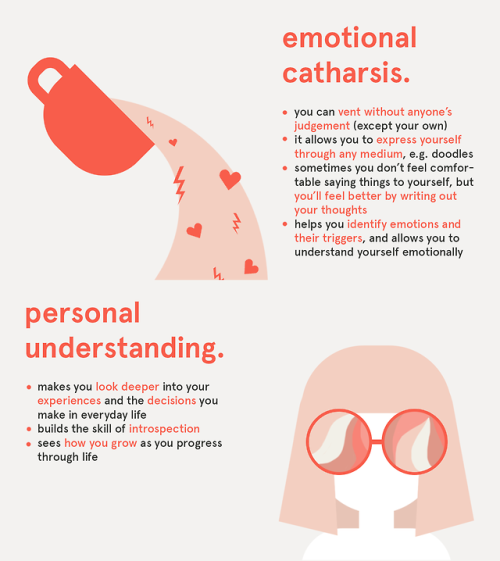
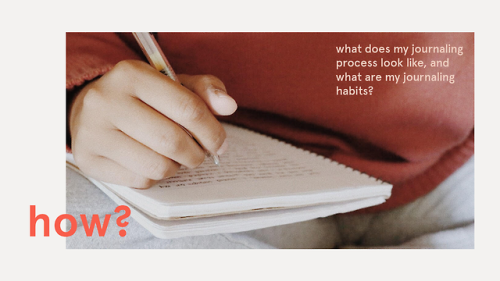
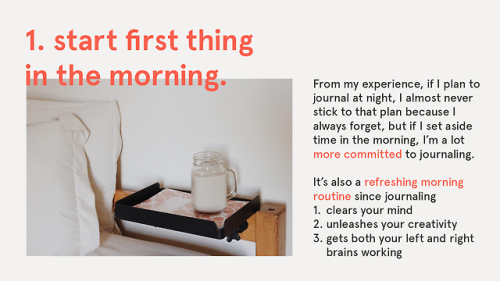
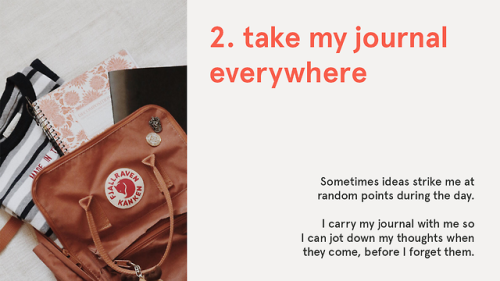
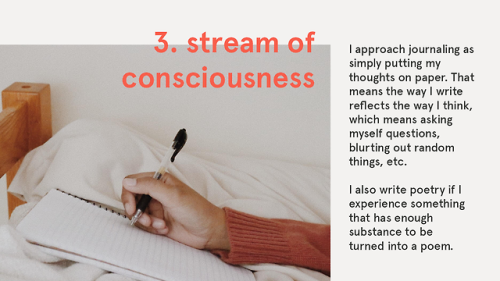
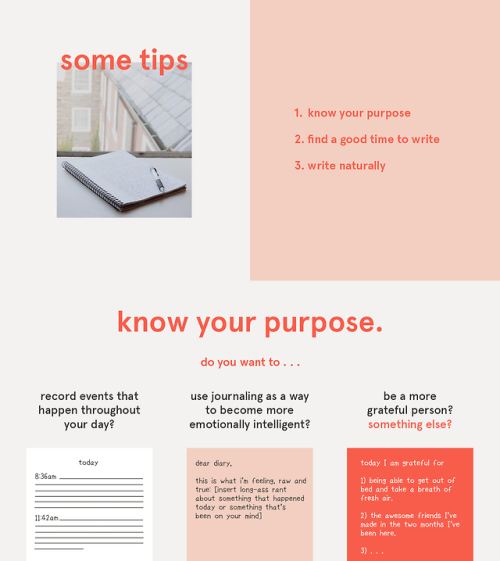
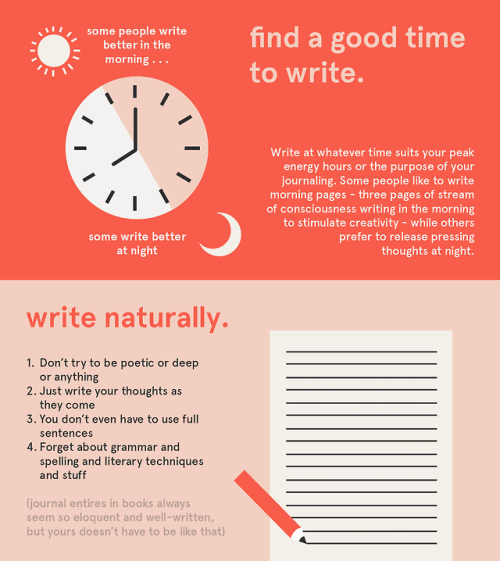
A Small Guide to Journaling by Eintsein
Something you may or may not know about be is that I journal. However, only recently have I gotten the hang of it and stayed loyal to the habit of journaling. Here are some tips and tricks on how you can journal successfully. Hope you like it :)
new quarter/semester checklist
1. turn over a new leaf
not happy with how your first quarter went? now is a good time to change that. do what you wish you’d done differently before. changing things on the middle of quarters can be hard, so now is the time.
2. organize yourself
don’t throw your previous stuff away!! you will probably need your papers and such for midterms later in the year. instead of throwing everything away or keeping it in an unorganized fashion with your new assignments and notes, set aside a space for it in your house. keep it all organized so you know when it’s from. ask your teachers/professors what you should hang on to.
3. prepare yourself
are there any supplies, books, etc you need for the new semester/quarter but don’t have? now is the time to figure out what you have and what you need to get before you get too deep in the semester/quarter
4. check in with yourself
are the systems you’re using working for you? the apps? note taking strategies? the amount of sleep you’re getting? make sure things are working for you. if they aren’t, try something else that might work
5. don’t worry
yes, school is important. yes, it will help you in the future. but it doesn’t define you. it’ll be okay if you don’t ace everything. you aren’t a failure and you aren’t worthless. it’s okay.
good luck, you’re going to do amazing





